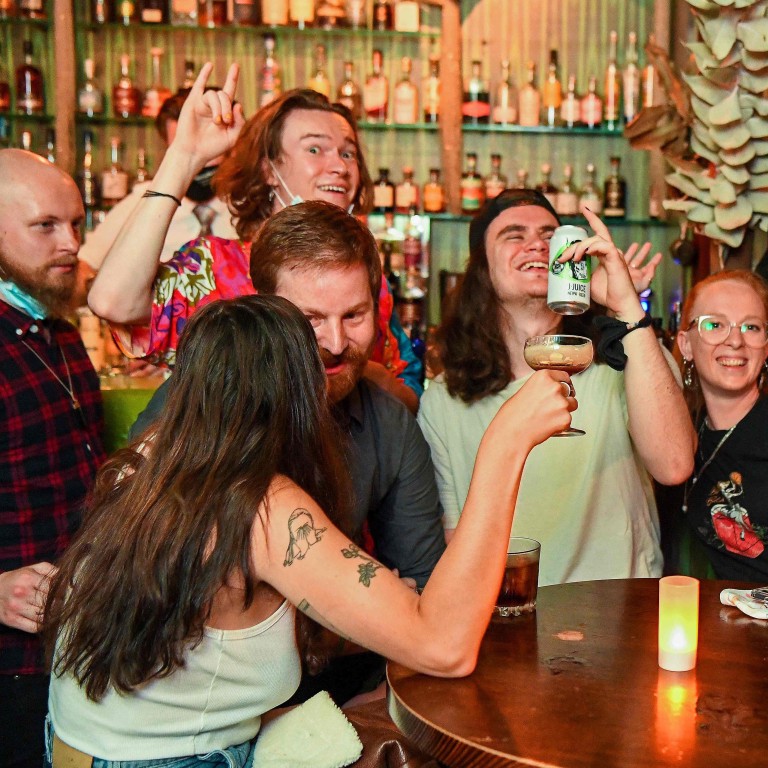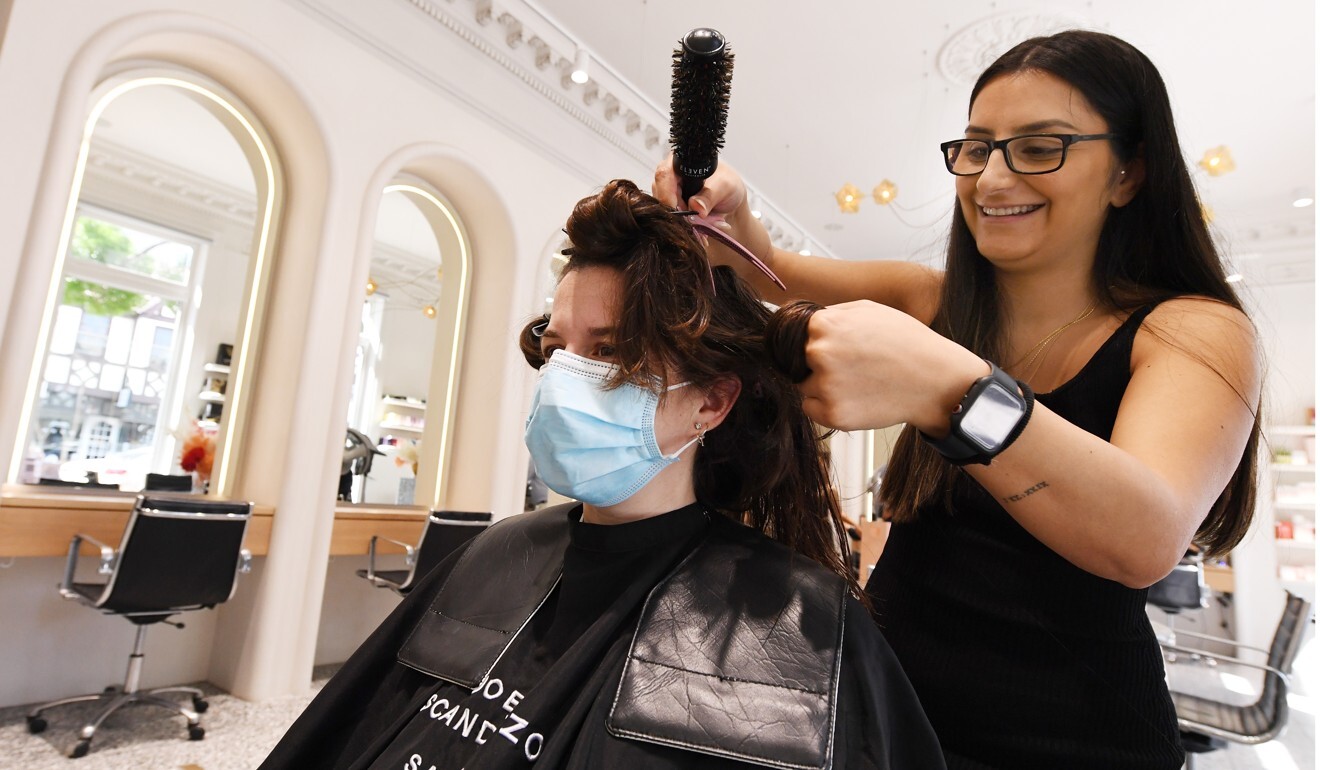
Coronavirus: New Zealand sets 90 per cent vaccine target to end lockdown; Melbourne reopens with cheers
- Once the target is reached, the government will begin to ease restrictions and introduce a new traffic-light system to gauge the level of risk in each region
- Elsewhere, Tokyo’s cases dropped to their lowest since last June, and Malaysia lifted its migrant worker ban and reopened Langkawi to foreigners
Once 90 per cent of the eligible population aged 12 and over is fully vaccinated, the government will begin to ease restrictions and introduce a new traffic-light system to gauge the level of risk in each region, Ardern said at a news conference on Friday in Wellington. The government will measure vaccination rates for each District Health Board around the country, she said.
“This target ensures good regional spread across the country and will also help address equity issues within each region,” Ardern said. “We will be one of the few countries that will have such high levels of vaccination while still using public health measures to keep everyone as safe as we can.”
New Zealand’s 90 per cent target compares with 80 per cent in Singapore, while Britain did away with restrictions before a 70 per cent vaccination rate was reached.
New Zealand faces growing calls for ‘circuit breaker’ lockdown
Currently, around 68 per cent of eligible New Zealanders are fully vaccinated, while 86 per cent have had at least one shot.
New Zealand had pursued a strict elimination strategy that served it well through the initial stages of the pandemic, but it has been unable to beat an outbreak of the highly infectious Delta variant in Auckland.
The nation’s largest city has been in lockdown for more than two months, with daily new case numbers rising in recent weeks, while mask-wearing and social distancing is still required throughout the rest of the country.
Ardern said at current vaccination rates, Auckland could exit lockdown before Christmas. Cabinet will review settings on November 29.

Once the 90 per cent target has been reached, lockdowns will no longer be used to manage outbreaks. Rather, a traffic-light system will be introduced that stipulates the level of restrictions required for a given region.
Red requires mask-wearing in all public venues and puts limits on gatherings, while green involves only limited restrictions such as mask-wearing on public transport.
A key part of the new system will be the use of vaccine certificates, which people will need to enter large gatherings such as concerts and sports events.
After a slow start, the government rushed vaccinations and has previously said it intends to start reopening the border in the first quarter of next year.
Ardern didn’t give any details on opening the border today, but stressed the need for people to get vaccinated.
“My message to the New Zealanders who have not yet had their first dose – if you want summer, if you want to go to bars and restaurants, get vaccinated,” she said. “If you want to get a haircut, get vaccinated. If you want to go to a concert, or a festival, get vaccinated. If you want to go to a gym, or a sports events, get vaccinated.”
Australia’s shift in messaging has lessons in leaving zero-Covid behind
Melbourne reopens with cheers
Melbourne residents flocked to the city’s pubs, restaurants and hair salons in the early hours of Friday after the world’s most locked-down city emerged from its latest spate of restrictions designed to combat the spread of Covid-19.
Argentina’s capital, Buenos Aires, last year went through 234 straight days of lockdown.
In Melbourne, people were seen cheering and clapping from their balconies, while cars honked horns continuously at 11.59pm (local time) on Thursday when lockdown restrictions in place since early August ended.
Many venues, including food outlets and even haircutters, opened at the unusual hour for the occasion.
Josh Mihan, owner of The Bearded Man barber shop in Melbourne, said he is nearly booked out for the next month and he is encouraging customers to make appointments for Christmas.
“We all love cutting hair and being on the floor is such a lovely feeling, being around people,” he said.
“I have urged our customer base, make sure you have booked in your Christmas cut.”

Under relaxed rules in Melbourne, restaurants and cafes can reopen with up to 20 people indoors and 50 outdoors – all of whom must be vaccinated – while 10 guests can gather at homes. Masks will remain mandatory.
Just over 70 per cent of adults in Australia are now fully vaccinated and many residents are planning to fly overseas again as international border restrictions start to ease from November.
Qantas Airways said on Friday that it would speed up plans to restart flights to many destinations and upsize some planes amid “massive demand”.
Qantas said it would launch a new route from Sydney to Delhi in early December and bring forward plans for flights to Singapore, Fiji, Johannesburg, Bangkok and Phuket.
“This is a wonderful day – Australia is ready for take-off,” Prime Minister Scott Morrison said soon after the Qantas announcement.
A quarantine-free travel bubble between Australia and Singapore could operate from next month, he said, if an agreement is reached as expected.
Even with the Delta outbreaks, Australia’s coronavirus numbers are still far lower than those of many comparable nations, with some 152,000 cases and 1,590 deaths.
The state of Victoria, of which Melbourne is the capital, reported 2,189 new local Covid-19 cases and 16 deaths on Friday.
Daily cases in New South Wales, home to Sydney where the Delta variant was first detected in June, dropped slightly to 345. The state recorded a further five deaths.
Tokyo sees fewest cases since June 2020
Tokyo confirmed 26 daily coronavirus cases on Friday, the fewest in over a year, as the downward trend in infections continues across Japan.
The figure released by the Tokyo metropolitan government was the lowest since June 17 last year, when the capital reported 16 new infections.
The seven-day rolling average of new daily cases in Tokyo stood at 39.1, down 40.4 per cent from the previous week, according to the metropolitan government.
The pace of new infections has been slowing since hitting a record 5,773 cases on August 13, days after the closing of the Olympics, as the roll-out of vaccinations progresses nationwide.
Reflecting the slowing trend, Tokyo along with Osaka decided on Thursday to lift coronavirus restrictions on restaurants and bars from next week, the first removal of measures in 11 months.
Malaysia lifts migrant worker ban, reopens Langkawi
The agreement reached by the government’s pandemic task force on foreign workers has been hotly anticipated by vital sectors like palm oil plantations and rubber glove manufacturing, which rely on migrant labour.
“The Special Committee on Pandemic Management today agreed with the proposed standard operating procedures for the entry of foreign workers into Malaysia, especially to meet the needs of the plantation sector,” Prime Minister Ismail Sabri Yaakob said in a statement. Migrant worker quotas and entry dates for other industries are still being ironed out, he said.
Malaysia restarts interstate, overseas travel as it hits vaccine milestone
From mid-November, Malaysia will also allow certain international travellers to visit its tropical holiday island of Langkawi, reopening its borders to foreign tourists for the first time since the start of the pandemic.
The prime minister said Malaysia is targeting vaccinated, “high-yield” and “quality” tourists, indicating those that will spend money and help boost the economy. It was not immediately clear how such tourists would be targeted. Tourists must show a negative Covid-19 result and vaccination certificate and have travel insurance of US$80,000, he said.
Thailand drops quarantine for foreign travellers
They are among 46 countries – including China, Australia and Singapore – to be added to the quarantine-free travel list from November 1, the government said. A nighttime curfew in 17 provinces, including Bangkok and resort Phuket, will lifted from October 31.
A decline in active cases and increase in vaccinations over the past several weeks has allowed the government to gradually relax restrictions for businesses to reopen and travel to resume, part of its “living with Covid” strategy.
Russell Crowe’s tweets show a silver lining in Thailand’s Covid-19 struggle
PM says Indian economy boosted by rising vaccinations
Modi called for vigilance against Covid-19 and recommended wearing masks during festivals.
India’s immunisation campaign hit a milestone of 1 billion vaccinations on Thursday. The country has covered three-quarters of its 944 million adults with at least one dose but only 31 per cent with two.
Melbourne to exit world’s longest lockdown; India hits 1 billion jab doses
Meanwhile, it emerged that tens of millions of Indian adults are unlikely to be fully vaccinated by the end of 2021, despite ample supplies, due to an unusually large gap between the doses of the most widely-used vaccine and growing complacency as cases fall.
The locally-produced AstraZeneca vaccine which is known as Covishield has a 12 to 16 week gap between doses, in contrast to the 8 to 12 week gap recommended by the World Health Organization. Based on current trends, the Covishield dosage gap means more than 200 million people will be eligible for their second dose only in late January even if all of them were to get their first shot on Friday.
People are also growing increasingly complacent about getting inoculated as infections and deaths have fallen sharply in the past month. The government wants to vaccinate all of the country’s 944 million adults by December but some 230 million of them have yet to get even a single dose.
“It is likely that the milestone may be missed by several weeks,” said Rajib Dasgupta, head of the Centre of Social Medicine & Community Health at New Delhi’s Jawaharlal Nehru University. “Reducing Covishield dosage interval is certainly a possibility to consider.”
In UK and India, two different experiences of Covid-19 Delta subtypes
Elsewhere in India, cinemas in the entertainment capital Mumbai reopened on Friday after more than 18 months of closure, the last of the many virus restrictions to go amid a decline in infections.
Theatres opened to half capacity, following the guidelines released last month, but struggled to lure the public back and mostly re-released earlier hits. Many shows were running with fewer audiences, movie ticketing portal BookMyShow showed.
To minimise the danger of the virus, only those with Covid-19 vaccination certificates or with a “safe status” on the state-run health app will be allowed to enter the theatres. Masks and temperature checks are mandatory and no food or beverages will be allowed inside. Theatres elsewhere in the country are already running shows.
Reporting by Bloomberg, Reuters, Kyodo, Associated Press
